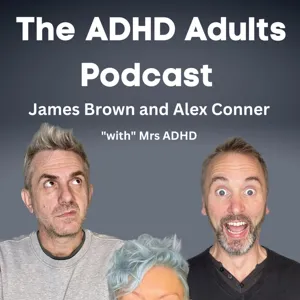Dr. Mark D'Esposito: How to Optimize Cognitive Function & Brain Health

Explore "executive function" with insightful episodes like "Dr. Mark D'Esposito: How to Optimize Cognitive Function & Brain Health", "The benefits of being bilingual, with Viorica Marian, PhD", "242. The illusion of endless options on dating apps and why it can be so harmful", "Episode 44: Parenting with ADHD (Part 1)" and "Frontal Fatigue With Dr. Mark Rego" from podcasts like ""Huberman Lab", "Speaking of Psychology", "Do You F*cking Mind?", "The ADHD Adults Podcast" and "Psychology Unplugged"" and more!


More than half the world’s population speaks more than one language. Viorica Marian, PhD, of Northwestern University, talks about why speaking multiple languages may have far-reaching cognitive benefits, how the bilingual brain processes language and how the languages we speak shape the way we think and perceive the world.
For transcripts, links and more information, please visit the Speaking of Psychology Homepage.

Let's talk about dating apps.
I asked you guys what you thought about them, the good and the bad. I pulled all this information together to had a chat about where dating apps fall short and why to not get too invested in them and how to not feel so hurt by them when things don't go well for you. I also go over your best and worst dating app situations and some of them are seriously F*****D!!
Brain Fact : Why fast sequencing tv shows are detrimental for young children and their development of executive control.
See omnystudio.com/listener for privacy information.

In the first of a double-fister, the ADHD adults James and Alex discuss parenting with ADHD from a mother's perspective. As James and Alex are probably not mothers, another ringer, the brilliant Jessica, is brought in to help. As usual, the 'podcast' (liberal use of the word there) contains psychoeducation on the subject delivered by balloon head, Jessica's personal reflections on being a parent with ADHD Tax and also her 'Top Tips'. 'What did James lose this week?" returns, and Alex continues to get communication from Robert from Kidderminster as well as from one real listener while continuing to alienate our international listeners with his terrible hellos. Alex rubs his fertility in James's face and James's sperm is just 'too powerful' (apparently).
Written by James Brown and Alex Conner.
Produced by James Brown and JBHD Ltd.
Social media contacts: @theadhdadults
Music by Sessionz
Send a message, question or future topic suggestion to the podcast
Subscribe to extra content


In Episode 12 James and Alex discuss the issue of 'getting shit done' which often leads to procrastination. As usual the three parts are psychoeducation, personal reflections on how a lack of task management causes issues for us has affected us and Top Tips. 'What did James lose this week?" continues to Alex's annoyance and Alex gets more emails, some of them real. James doesn't read the script (there is one) and Alex talks about sandwiching which apparently isn't a sex act.
Written by James Brown and Alex Conner.
Produced by James Brown and JBHD Ltd.
Social media contacts: @theadhdadults
Music by Sessionz
Send a message, question or future topic suggestion to the podcast
Subscribe to extra content

In Episode 9 James and Alex discuss the commonly reported phenomenon of 'object invisibility', which is like 'out of sight out of mind' on steroids. As usual some psychoeducational (loosely speaking), personal reflections on how it has affected us and Top Tips. 'What did James lose this week?" continues and Alex gets some emails now we have 10 listeners. James has a fat neck and Alex misses a chance to point out James's improper use of 'literally'.
Written by James Brown and Alex Conner.
Produced by James Brown and JBHD Ltd.
Social media contacts: @theadhdadults
Music by Sessionz
Send a message, question or future topic suggestion to the podcast
Subscribe to extra content

In Finland, children don't start formal schooling until age seven, aren't subject to standardized testing, and always get at least one hour of physical activity a day, broken into 15-minute free-play breaks every hour, which take place outside no matter the weather. Finnish parents and teachers espouse mantras like, "Let children be children," "The children must play," and "The work of a child is to play." Yet despite this emphasis on play, Finnish students still achieve enviable academic outcomes, and grow up to become some of the happiest adults on earth.
My guest today says that the Finnish model of education and parenting, with its heavy emphasis on play, is worth replicating in other countries. His name is Pasi Sahlberg and he's a Finnish educator and researcher currently living in Australia, as well as the co-author, along with William Doyle, of the book Let the Children Play: How More Play Will Save Our Schools and Help Children Thrive. Pasi begins our conversation by sharing what the data says as to how much less kids are playing today than they did in the past, and the factors that have led to this decrease both at school and at home. We discuss the fact that even the play kids do now engage in is more structured and adult-directed, even sometimes involving something called a "recess coach," and how this has led to the sad phenomenon of children who no longer know how to play on their own. We then discuss what is lost when kids don't play enough, from a decline in physical and mental confidence to a decrease in creativity. We end our conversation with the elements of healthy play that educators and parents who want to revive it can look to incorporate in their children's lives.
Stay up to date
For any inquiries, please email us at hello@podcastworld.io